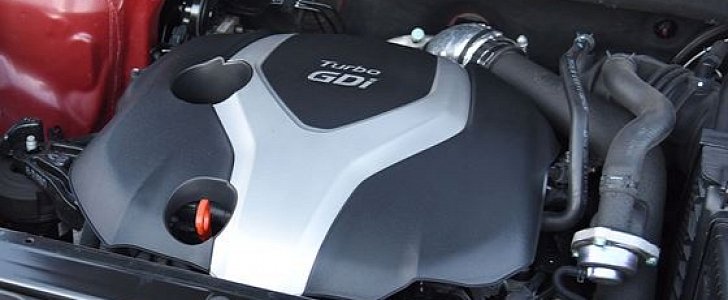Last week, news surfaced of Hyundai-Kia recalling 3.7 million cars on account of possible engine fire hazard. The announcement made by the two companies was even more disconcerting because some of the cars on the list had been already recalled in previous years and improperly fixed.
In an attempt to sort things out, the Insurance Institute for Highway Safety (IIHS), through its Highway Loss Data Institute (HLDI), released on Tuesday the results of a study it conducted into the matter. Unfortunately, the findings do nothing but to deepen the mystery,
The HLDI used non-crash fire claims for Kia Optima, Kia Sorento, Hyundai Sonata and Hyundai Santa Fe received from insurance companies to conduct the study. It found that the above models have a higher rate of fire claims than similar models from other brands.
More specifically, Hyundai and Kia vehicles equipped with a 2.0-liter turbocharged engine had 4.2 claims per 10,000 insured vehicle years, as opposed to 1.7 for the control vehicles (which remain unnamed), while cars from the two carmakers equipped with a 2.4-liter engine had a fire claim frequency of 2.7 per 10,000 insured vehicle years.
The two engines are part of the Theta II family and were originally at the center of the recalls conducted by Hyundai and Kia in previous years.
As for what is causing the fires, the IIHS is not sure. The organization corroborated the carmakers’ findings that the fire risk increased dramatically as the vehicles aged (IIHS does not say what exactly that means), but warns that the problem may be unrelated to the engines after all.
To back its claim, the IIHS cites “a large number of fires, including one in which a driver died” to the Kia Soul, a car that does not use the type of engine included in the current recall.
Overall, the IIHS concludes that the “companies are correctly targeting vehicles with small and/or turbocharged engines” but warns that “it's unclear whether their proposed remedy will eliminate the additional risk of fire that these models carry.”
The fix proposed by Hyundai and Kia consists of installing a knock sensor detection system in the cars to prevent the engine from exceeding 65 mph and 2,000 RPM when a problem is detected.
For some of the cars initially recalled, Hyundai and Kia found that the fuel tube may not have been properly connected to the high-pressure fuel pump and hence need to be fixed one more time.
The HLDI used non-crash fire claims for Kia Optima, Kia Sorento, Hyundai Sonata and Hyundai Santa Fe received from insurance companies to conduct the study. It found that the above models have a higher rate of fire claims than similar models from other brands.
More specifically, Hyundai and Kia vehicles equipped with a 2.0-liter turbocharged engine had 4.2 claims per 10,000 insured vehicle years, as opposed to 1.7 for the control vehicles (which remain unnamed), while cars from the two carmakers equipped with a 2.4-liter engine had a fire claim frequency of 2.7 per 10,000 insured vehicle years.
The two engines are part of the Theta II family and were originally at the center of the recalls conducted by Hyundai and Kia in previous years.
As for what is causing the fires, the IIHS is not sure. The organization corroborated the carmakers’ findings that the fire risk increased dramatically as the vehicles aged (IIHS does not say what exactly that means), but warns that the problem may be unrelated to the engines after all.
To back its claim, the IIHS cites “a large number of fires, including one in which a driver died” to the Kia Soul, a car that does not use the type of engine included in the current recall.
Overall, the IIHS concludes that the “companies are correctly targeting vehicles with small and/or turbocharged engines” but warns that “it's unclear whether their proposed remedy will eliminate the additional risk of fire that these models carry.”
The fix proposed by Hyundai and Kia consists of installing a knock sensor detection system in the cars to prevent the engine from exceeding 65 mph and 2,000 RPM when a problem is detected.
For some of the cars initially recalled, Hyundai and Kia found that the fuel tube may not have been properly connected to the high-pressure fuel pump and hence need to be fixed one more time.

